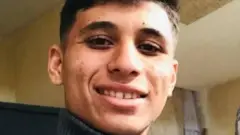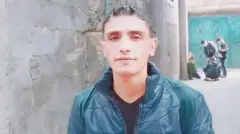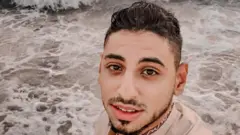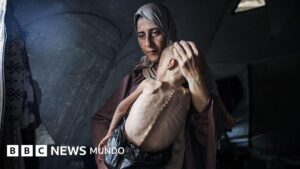

Image source, AFP /Getty Images
-
- Author, Ethar shalaby
- Author's title, BBC Arabic Service
A teenager who went for food and a man who endured months of malnutrition, are among those killed during the last week in Gaza.
On Thursday, the Ministry of Health of the Strip, controlled by Hamas, registered two new deaths from hunger and malnutrition in the last 24 hours, while humanitarian aid agencies warned that Israel's siege to Gaza was causing a “mass famine” throughout the territory.
An Israeli government spokesman denied it, stating that Hamas was responsible for food shortages and kidnapping of humanitarian aid.
Given the UN warning that humanitarian conditions in Gaza are deteriorating at an “accelerated” rhythm and the affirmation of the World Health Organization that at least 10% of Gaza inhabitants suffer acute malnutrition, BBC spoke with several people in that territory about loved ones who have recently lost.

Image source, Family courtesy
Abdullah Jendeia, 19 years old
Abdullah Omar Jendeia, 19, died on Sunday, July 20 when he went to look for food, according to his sister Nadreen.
They had been living in the deteriorated house of their mother in Al-Sabra, in the center of Gaza.
“I was impatient to go looking for food that day,” says Nadreen.
“I said: 'Eat the few lentils that we have left', but he refused.”
According to her, around 4 in the afternoon Abdullah left home to walk more than 5 kilometers north in search of a humanitarian aid truck that arrives every week.
His idea was to get a few kilos of flour to feed the family. He was accompanied by two of his brothers and some brothers -in -law.
At approximately 11 at night, one of the brothers, Mahmoud, called Nadreen to tell him that while they waited next to the humanitarian aid truck, Israeli soldiers had suddenly opened fire against them.
They were in the Netzarim corridor, a military zone that separates the north of the South Gaza Strip.
Mahmoud told Nadreen that Abdullah had died and that he and the other brother had been injured.
“It was a pleasure to be with him, he was kind and fun at the same time,” she says, remembering the walks they used to give in Gaza Beach when they were younger.
“He loved football and sport.”
She tells that Abdullah used to work with local shopkeepers, helping them transport fruits and vegetables, and “dreamed of opening a new business after the war.”
In response, the Israel Defense Forces (FDI) affirmed that they were acting to dismantle Hamas's military capacity and that they took all possible precautions to mitigate damage to the civilian population.
They also affirmed that it could “better attend their application (information) if it could provide the coordinates” of the location of the incident.
The Gaza Civil Defense Agency, directed by Hamas, said that Israeli shots had killed a total of 93 people and wounded to dozens in all of Gaza that day, mainly close to the aid points.
When referring to a specific incident in northern Gaza, the Israeli army said the troops made warning shots against a crowd “to eliminate an immediate threat,” but questioned the number of deaths.
Ahmed Alhasant, 41 years

Image source, Family courtesy
Ahmed Alhasant, 41, died on Tuesday, July 22.
His brother, Yehia Alhasanat, affirms that “malnutrition killed him; day after day, his condition worsened more and more.”
Yehia says that her brother began to feel bad after Israel imposed a blockade of humanitarian aid in Gaza in March. Since May, Israel has allowed the entry of some help to the territory, but humanitarian organizations claim that it is far from being sufficient.
For three months, Ahmed, who was also diabetic, could not get enough food or drink. It depended on pieces of bread and, occasionally, of canned food, says Yehia.
As a result of this, says Yehia, its weight was drastically reduced from 80 to 35 kilos and its health deteriorated quickly.
“He spoke with difficulty and sometimes we barely understood him,” he says.
Ahmed's cousin, Refaat Alhasant, says that the family took him to the hospital, but “they told us that he needed food, no medicines. So we took him back home.”
Yehia says that Ahmed, who was dedicated to installed parabolic antennas and was fond of football, “died quietly” at his home in the city of Deir Al-Balah, in the center of Gaza.
“He had a strong personality and was one of the most friendly people who could know,” adds Yehia.
Mohamed Kulab, 29 years old

Image source, Family courtesy
Mohamed Kulab, 29, died in an air attack on July 22, according to his brother -in -law.
Amar Ragaida explains that Mohamed was resting in his tent in a camp for displaced Palestinians in the Al-Qadesiya area, west of Jan Youis, in southern Gaza, when an air attack reached the area between 5 and 6 in the afternoon, local time.
“He was alone. We learned that he had died a few hours after the bombing, when some people called his sister and informed him of his death,” says Amar.
Amar affirms that he spoke with Mohamed the day before his death: they found themselves by chance while looking for help.
“He told me: 'Don't go alone, I'll try to get some flour.' The next day, I was dead.”
Mohamed leaves a sister and a younger brother who depended completely on him, says love.
“Kulab was a respectful young man, full of life. He did not get into unnecessary matters and all those around him loved him,” he says.
In response, Israel's defense forces issued a statement similar to what they gave in the case of Abdullah, saying that they took “the possible precautions to mitigate damage to the civilian population” and that they would need the coordinates of the place where he died to investigate his case more thoroughly.

Subscribe here To our new newsletter to receive every Friday a selection of our best content of the week.
And remember that you can receive notifications in our app. Download the latest version and act.







